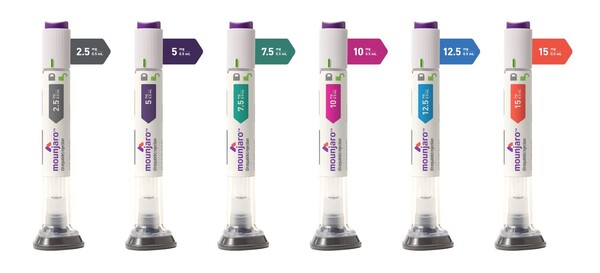Eli Lilly Korea said its dual GIP/GLP-1 receptor agonist, Mounjaro (ingredient: tirzepatide), has been approved by the Ministry of Food and Drug Safety (MFDS) for chronic weight management in adults.

This approval, granted on Thursday, marks a significant milestone in the treatment of obesity in Korea. With this development, Mounjaro has secured its second indication in Korea, following its June 2023 approval for improving glycemic control in adults with type 2 diabetes.
Mounjaro, the first and only GIP/GLP-1 receptor agonist of its kind, works by targeting and activating both GIP and GLP-1 receptors. These incretin hormones play crucial roles in insulin secretion, insulin sensitivity, glucagon secretion, appetite control, and satiety maintenance.
The approval comes at a critical time, as obesity rates in Korea have been steadily increasing over the past decade, with particularly sharp rises in severe obesity cases. According to the Korean Association of Health Economics and Policy, the socioeconomic loss due to obesity in Korea is estimated at 16 trillion won annually as of 2021.
The new approval allows Mounjaro to be used as an adjunct to a reduced-calorie diet and increased physical activity for chronic weight management in adults with obesity (BMI ≥ 30 kg/m²) or overweight (BMI 27-30 kg/m²) with at least one weight-related comorbidity such as hypertension, dyslipidemia, type 2 diabetes, obstructive sleep apnea, or cardiovascular disease.
The MFDS approved the expanded indication based on two phase 3 clinical trials, SURMOUNT-1 and SURMOUNT-2.
These trials demonstrated significant weight loss in patients treated with Mounjaro compared to placebo. The drug showed consistent efficacy across various subgroups, including age, gender, race, ethnicity, baseline BMI, and glycemic status.
The safety profile of Mounjaro was consistent with previous clinical trials in type 2 diabetes patients. The most commonly reported adverse events were gastrointestinal disorders and hypoglycemia in patients with type 2 diabetes concurrently using sulfonylureas, metformin, and/or SGLT-2 inhibitors.
"Obesity affects approximately 17 million adults in Korea and increases the risk of over 200 complications, including type 2 diabetes and cardiovascular diseases,” Korean Society for the Study of Obesity President Park Cheol-yeong said. “With the development of new anti-obesity medications, we hope this will encourage more active medical interventions for patients with severe obesity who have faced limitations in weight management despite lifestyle interventions."
Lilly Korea Executive Director of Diabetes Business Unit and CMO Kim Kye-won also said, “Despite extensive research and substantial scientific evidence, obesity patients in Korea still experience stigma and prejudice related to their weight.”
This can hinder patients' efforts to improve their health and negatively impact the quality of treatment they receive, Kim added.
She further stressed that starting with the expansion of Mounjaro's indications, Lilly will continue to do its best to create a treatment environment where obesity patients can be diagnosed in a timely manner and receive evidence-based obesity management by improving the misperceptions about obesity in society.
Related articles
- Diabetes drug Mounjaro landed here. But can Koreans use it?
- GLP-1 analogs, new trend in obesity treatment, become even more effective
- Eli Lilly Korea names John Bickel as new GM
- Lilly Korea’s new atopic dermatitis drug ‘Ebglyss' receives approval
- Newly diagnosed diabetes during hospitalization affects mortality, length of stay
- ‘Don’t give up life-saving statin drugs just because of concerns’
- Mounjaro praised as ‘super GLP-1,’ sparking interest in Korean launch, insurance coverage
- Eli Lilly launches atopic dermatitis drug Ebglyss in Korea
- Korean Diabetes Association removes metformin as preferred first-line therapy in latest guidelines

